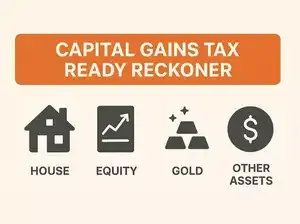The capital gains rules got updated starting July 23, 2024, for the fiscal year 2024-25. Since these changes happened mid-year, both the old and new capital gains rules will apply, depending on the date of sale or transfer.
Taxpayers filing income tax return (ITR) for FY 2024-25 (Assessment Year 2025-26) must be careful while calculating capital gains and the tax on them to make sure they submit the correct information.
ET Wealth online offers a ready reckoner for capital gains on house properties (including land and building), equity shares (both listed and unlisted), gold, and other assets for FY 2024-25. The ready reckoner is useful for both resident and non-resident individuals.
Also Read| ITR filing last date is not same for everyone: Which due date applies to you?
The capital gains from the sale of house property will be termed as Short-term Capital Gains (STCG), provided the house is sold on or before the completion of two years from the date of purchase or construction.
STCG from selling house property will be taxed according to the income tax slabs that apply to your income. This means that, depending on the income tax regime you have chosen (old or new), the income tax liability will be calculated.
Hence, irrespective of your residential status, the STCG tax will be calculated as per the income tax slabs applicable to your income.
The capital gains made from the sale of house property will be termed as Long-term Capital Gains (LTCG), provided the house is sold after the completion of two years from the date of purchase or construction. Here, the tax rate will depend on the individual taxpayer's residential status and date of purchase.
b) Purchase cost is not inflated, and LTCG is taxed at 12.5% of the absolute gain
The process of inflating the purchase price to account for inflation with the help of the CII table is also termed as the Indexation benefit.
For a house bought on or after July 23, 2024, the LTCG will be taxed at 12.5% on the absolute gains. The purchase price cannot be inflated to reduce gains.
Wadhwa says, "The tax rate for resident, but ordinarily resident (ROR), and residents who are not ordinarily resident (RONR) is the same. For NRI taxpayers, the long-term capital gains from selling house property will be taxed at 12.5% on the absolute gains, no matter when the property was bought."
The holding period is the same for house property under the old and new capital gains rules. Even the STCG tax rate is the same as the new rule for all individual taxpayers, irrespective of residential status. STCG will be taxed according to the income tax slabs you come under.
According to old rules, the LTCG on house property is taxed at 20% after the purchase price is inflated to claim the indexation benefit. Wadhwa says, "The old capital gain rule for house property applies to all taxpayers, regardless of their residential status."
Also READ| LTCG tax exemption from equity hiked by Rs 25,000: What is the new LTCG tax exemption limit for listed equity shares and equity mutual funds?
Gains arising from the sale of listed equity will be short-term capital gains (STCG) if they are sold on or before the completion of one year. The STCG on the sale of listed equity shares on or after July 23, 2024, will be taxed at 20% plus cess.
Gains arising from the sale of listed equity will be long-term capital gains (LTCG) if they are sold after the completion of one year. LTCG from listed equity sold on or after July 23, 2024, would be taxed at 12.5%. Only LTCG left after claiming the exemption will be taxed at this rate.
An individual can claim an exemption on the LTCG from listed equity and equity mutual funds. A total exemption of Rs 1.25 lakh can be claimed from listed equity and equity mutual funds for FY2024-25.
Also Read | ITR form changes: Which ITR form applies to your income for ITR filing this year?
Capital gains from listed equity shares sold on or before the completion of one year will be termed as STCG. However, STCG from listed equity shares will be taxed at 15% plus cess at 4%.
Similarly, capital gains from listed equity shares sold after the completion of one year will be termed as LTCG.
Under the old rules, LTCG from listed equity shares will be taxed at 10%.
LTCG exemption on listed equity and equity mutual funds will remain Rs 1.25 lakh for FY 2024-25, irrespective of the date of sale for listed equity shares and equity mutual funds.
Wadhwa says, "The old and new rules mentioned above for listed equity apply to those listed shares where STT is paid at the time of redemption. However, capital gains tax rates differ if STT is not paid at the time of redemption for listed shares. STCG are taxed at income tax slabs applicable to the income under the old and new rules.
However, in the case of LTCG for listed equity, where STT is not paid, the capital gains will be taxed differently under the old and new rules. Under the old rules, LTCG will be taxed at the lower of 20% with indexation or 10% without indexation. Under the new rules, LTCG will be taxed at 12.5% without indexation. Individuals should verify whether STT was paid at the time of redemption to ensure the correct tax rates are applied."
Capital gains from the sale of unlisted equity shares will be termed STCG if the shares are sold on or before the completion of two years. STCG will be taxed as per the income tax slabs applicable to the taxpayer's income.
Capital gains from the sale of unlisted equity shares will be termed LTCG if the shares are sold after the completion of two years. LTCG will be taxed at 12.5% without an indexation benefit (i.e., without adjusting the purchase price of unlisted shares for inflation). NRIs must note that they will not get any benefit from forex fluctuations.
Capital gains from the sale of unlisted equity shares will be termed STCG if the shares are sold on or before the completion of two years. STCG will be taxed as per the income tax slabs applicable to the taxpayer's income.
Capital gains from the sale of unlisted equity shares will be termed LTCG if the shares are sold after the completion of two years. In case of ROR and RONR, LTCG will be taxed at 20% with indexation for shares sold on or before July 22, 2024. For NRIs, LTCG will be taxed at 10% without indexation and foreign exchange fluctuation for shares sold on or before July 22, 2024.
The capital gains rules for unlisted equity shares and unlisted preference shares are the same under the new and old rules.
Similarly, in the case of unlisted securities and non-financial assets, the capital gains are termed LTCG if the asset is sold after the completion of two years. If the capital gains arise on or before the completion of two years, then the gains are termed as STCG.
Capital gains arising from the sale of gold after the completion of two years will be termed as LTCG. These gains will be taxed at 12.5% without the benefit of indexation.
Capital gains arising from the sale of gold after the completion of three years will be termed as LTCG. These gains will be taxed at 20% with an indexation benefit, i.e., by adjusting the purchase price for inflation.
Wadhwa says, "The old and new rules for STCG and LTCG for gold are the same for all individuals irrespective of their residential status. The old and new capital gains rules for gold apply to the sale of physical gold and digital gold. The capital gain rules are different for gold mutual funds and gold ETFs."
Taxpayers filing income tax return (ITR) for FY 2024-25 (Assessment Year 2025-26) must be careful while calculating capital gains and the tax on them to make sure they submit the correct information.
ET Wealth online offers a ready reckoner for capital gains on house properties (including land and building), equity shares (both listed and unlisted), gold, and other assets for FY 2024-25. The ready reckoner is useful for both resident and non-resident individuals.
Also Read| ITR filing last date is not same for everyone: Which due date applies to you?
New capital gains rule for house property from July 23, 2024
Naveen Wadhwa, Vice President of Research & Advisory at Taxmann.com, says, "The new capital gains rule for house property will depend on the residential status of an individual taxpayer. This means that an individual taxpayer must check their residential status - i.e., Resident and ordinarily resident (ROR), Resident but not ordinarily resident (RONR), and non-resident (NR) - to determine the rules applicable to them. The short-term capital gains (STCG) rules are the same for individuals irrespective of their residential status. For long-term capital gains (LTCG), the new rules differ depending on one's residential status."New STCG and LTCG rules for house property
The capital gains arising from the sale of a house property can be classified as either short-term or long-term.The capital gains from the sale of house property will be termed as Short-term Capital Gains (STCG), provided the house is sold on or before the completion of two years from the date of purchase or construction.
STCG from selling house property will be taxed according to the income tax slabs that apply to your income. This means that, depending on the income tax regime you have chosen (old or new), the income tax liability will be calculated.
Hence, irrespective of your residential status, the STCG tax will be calculated as per the income tax slabs applicable to your income.
The capital gains made from the sale of house property will be termed as Long-term Capital Gains (LTCG), provided the house is sold after the completion of two years from the date of purchase or construction. Here, the tax rate will depend on the individual taxpayer's residential status and date of purchase.
In the case of a house bought on or before July 22, 2024 but sold on or after July 23, 2024, the LTCG tax for a resident individual and HUF will be the lower of the following:
a) Purchase cost is inflated to account for inflation with the help of the CII table from Income Tax Department and LTCG is taxed at 20% on reduced gainsb) Purchase cost is not inflated, and LTCG is taxed at 12.5% of the absolute gain
The process of inflating the purchase price to account for inflation with the help of the CII table is also termed as the Indexation benefit.
For a house bought on or after July 23, 2024, the LTCG will be taxed at 12.5% on the absolute gains. The purchase price cannot be inflated to reduce gains.
Wadhwa says, "The tax rate for resident, but ordinarily resident (ROR), and residents who are not ordinarily resident (RONR) is the same. For NRI taxpayers, the long-term capital gains from selling house property will be taxed at 12.5% on the absolute gains, no matter when the property was bought."
| Asset Class | Old Rule (Until July 22, 2024) | New Rule (From July 23, 2024) |
| House Property | STCG: • Sold within 2 years • Taxed as per income slab LTCG: • Sold after 2 years • 20% with indexation • Applies to all residential statuses | STCG: • Same as old – slab rate LTCG: • Bought ≤ July 22 & sold ≥ July 23: ‒ ROR/RONR: Lower of 20% with indexation or 12.5% without ‒ NR: 12.5% without indexation Bought ≥ July 23: 12.5% without indexation (all) |
| Listed Equity Shares | Case I: If STT is paid STCG: • Sold within 1 year • 15% + 4% cess LTCG: • Sold after 1 year • 10% beyond ₹1.25L exemption Case II: If STT not paid: STCG – slab rate LTCG – Lower of 20% with indexation or 10% without | Case I: If STT paid: STCG: • Sold within 1 year • 20% + cess LTCG: • Sold after 1 year • 12.5% beyond ₹1.25L exemption Case II: If STT not paid: STCG – slab rate LTCG – 12.5% without indexation |
| Unlisted Equity Shares | STCG: • Sold within 2 years • Taxed as per slab LTCG: • ROR/RONR – 20% with indexation • NR – 10% without indexation or forex benefit | STCG: • Same as old – slab rate LTCG: • 12.5% without indexation • No forex benefit for NR |
| Gold & Other Assets | STCG: • Sold within 3 years • Taxed as per slab LTCG: • Sold after 3 years • 20% with indexation | STCG: • Sold within 2 years • Taxed as per slab LTCG: • Sold after 2 years • 12.5% without indexation |
Old capital gains rules for house property sold on or before July 22, 2024
If you have sold house property on or before July 22, 2024, then the old capital gains rules will apply.The holding period is the same for house property under the old and new capital gains rules. Even the STCG tax rate is the same as the new rule for all individual taxpayers, irrespective of residential status. STCG will be taxed according to the income tax slabs you come under.
According to old rules, the LTCG on house property is taxed at 20% after the purchase price is inflated to claim the indexation benefit. Wadhwa says, "The old capital gain rule for house property applies to all taxpayers, regardless of their residential status."
New capital gains rules for equity shares on or after July 23, 2024
Equity taxation depends on whether shares are listed on a stock exchange or are unlisted. The holding period for categorising capital gains as STCG or LTCG will differ for listed and unlisted equities.Also READ| LTCG tax exemption from equity hiked by Rs 25,000: What is the new LTCG tax exemption limit for listed equity shares and equity mutual funds?
New STCG and LTCG rules for listed shares from July 23, 2024
Wadhwa says, "The new STCG and LTCG rules for listed equity are the same for all individuals irrespective of their residential status. This means that whether you are ROR, RONR or NR, the same rules apply."Gains arising from the sale of listed equity will be short-term capital gains (STCG) if they are sold on or before the completion of one year. The STCG on the sale of listed equity shares on or after July 23, 2024, will be taxed at 20% plus cess.
Gains arising from the sale of listed equity will be long-term capital gains (LTCG) if they are sold after the completion of one year. LTCG from listed equity sold on or after July 23, 2024, would be taxed at 12.5%. Only LTCG left after claiming the exemption will be taxed at this rate.
An individual can claim an exemption on the LTCG from listed equity and equity mutual funds. A total exemption of Rs 1.25 lakh can be claimed from listed equity and equity mutual funds for FY2024-25.
Also Read | ITR form changes: Which ITR form applies to your income for ITR filing this year?
Old STCG and LTCG rules for listed shares till July 22, 2024
There is no change in the holding period for listed equity under the old and new capital gains rules. The old capital gains rules for STCG and LTCG are the same for individuals irrespective of their residential status.Capital gains from listed equity shares sold on or before the completion of one year will be termed as STCG. However, STCG from listed equity shares will be taxed at 15% plus cess at 4%.
Similarly, capital gains from listed equity shares sold after the completion of one year will be termed as LTCG.
Under the old rules, LTCG from listed equity shares will be taxed at 10%.
LTCG exemption on listed equity and equity mutual funds will remain Rs 1.25 lakh for FY 2024-25, irrespective of the date of sale for listed equity shares and equity mutual funds.
Wadhwa says, "The old and new rules mentioned above for listed equity apply to those listed shares where STT is paid at the time of redemption. However, capital gains tax rates differ if STT is not paid at the time of redemption for listed shares. STCG are taxed at income tax slabs applicable to the income under the old and new rules.
However, in the case of LTCG for listed equity, where STT is not paid, the capital gains will be taxed differently under the old and new rules. Under the old rules, LTCG will be taxed at the lower of 20% with indexation or 10% without indexation. Under the new rules, LTCG will be taxed at 12.5% without indexation. Individuals should verify whether STT was paid at the time of redemption to ensure the correct tax rates are applied."
New STCG and LTCG rules for unlisted shares from July 23, 2024
Unlisted equity shares have a longer holding period for capital gains to be considered long-term, compared to listed equity shares. Wadhwa says, "Under the new rules, the tax rate remains the same for individuals, regardless of their residential status."Capital gains from the sale of unlisted equity shares will be termed STCG if the shares are sold on or before the completion of two years. STCG will be taxed as per the income tax slabs applicable to the taxpayer's income.
Capital gains from the sale of unlisted equity shares will be termed LTCG if the shares are sold after the completion of two years. LTCG will be taxed at 12.5% without an indexation benefit (i.e., without adjusting the purchase price of unlisted shares for inflation). NRIs must note that they will not get any benefit from forex fluctuations.
Old STCG and LTCG rules for unlisted shares till July 22, 2024
Wadhwa says, "The taxation of capital gains from unlisted equity under the old rules depends on the residential status. In the case of LTCG, the ROR and RONR benefit from indexation. However, NRIs cannot get the indexation benefit."Capital gains from the sale of unlisted equity shares will be termed STCG if the shares are sold on or before the completion of two years. STCG will be taxed as per the income tax slabs applicable to the taxpayer's income.
Capital gains from the sale of unlisted equity shares will be termed LTCG if the shares are sold after the completion of two years. In case of ROR and RONR, LTCG will be taxed at 20% with indexation for shares sold on or before July 22, 2024. For NRIs, LTCG will be taxed at 10% without indexation and foreign exchange fluctuation for shares sold on or before July 22, 2024.
The capital gains rules for unlisted equity shares and unlisted preference shares are the same under the new and old rules.
Gold and other assets
The new rules have simplified the holding periods for listed and unlisted securities and non-financial assets. In the case of listed financial assets, capital gains arising from the sale after one year are termed as LTCG. If the gains arise on or before the completion of one year, then the gains are STCG.Similarly, in the case of unlisted securities and non-financial assets, the capital gains are termed LTCG if the asset is sold after the completion of two years. If the capital gains arise on or before the completion of two years, then the gains are termed as STCG.
New STCG and LTCG rules for gold from July 23, 2024
Capital gains arising from the sale of gold on or before the completion of the two years will be termed as STCG. These gains from gold will be added to the total taxable income and taxed at the income tax slabs applicable to your income.Capital gains arising from the sale of gold after the completion of two years will be termed as LTCG. These gains will be taxed at 12.5% without the benefit of indexation.
Old STCG and LTCG rules for gold till July 22, 2024
Under the old rules, capital gains arising from the sale of gold will be termed as STCG if the gold is sold on or before the completion of three years. These gains from gold will be added to the total taxable income and taxed at the income tax slabs applicable to your income.Capital gains arising from the sale of gold after the completion of three years will be termed as LTCG. These gains will be taxed at 20% with an indexation benefit, i.e., by adjusting the purchase price for inflation.
Wadhwa says, "The old and new rules for STCG and LTCG for gold are the same for all individuals irrespective of their residential status. The old and new capital gains rules for gold apply to the sale of physical gold and digital gold. The capital gain rules are different for gold mutual funds and gold ETFs."








